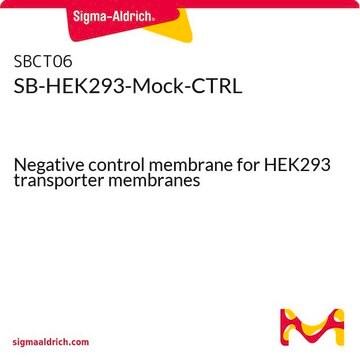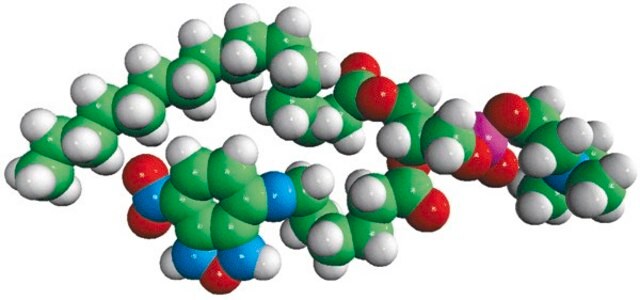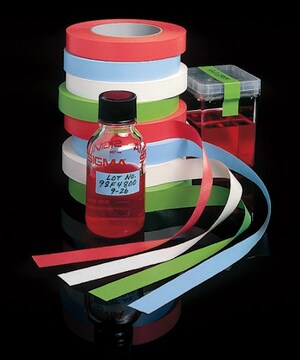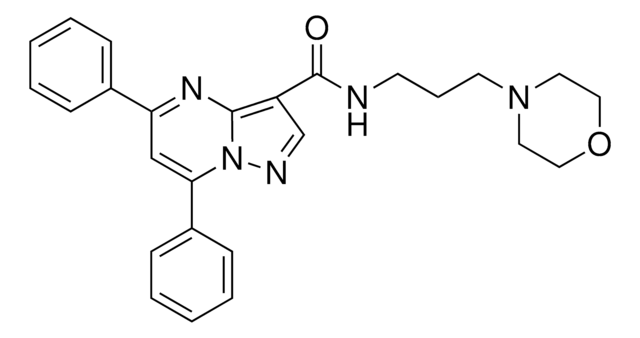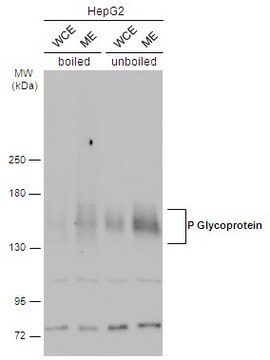SBVT07
SB-MRP4-HEK293
MRP4 human membrane vesicles
Sinónimos:
ABCC4, MRP, Multidrug resistance associated protein 4
Iniciar sesiónpara Ver la Fijación de precios por contrato y de la organización
About This Item
UNSPSC Code:
41106514
Productos recomendados
recombinant
expressed in HEK 293 cells
form
liquid
concentration
5 mg/mL
color
off-white
UniProt accession no.
shipped in
dry ice
storage temp.
−70°C
Gene Information
human ... ABCC4(10257)
General description
Membrane Preparations for Vesicular Transport Assays (VT) are suitable for general drug-efflux transporter interaction studies. Both substrate and inhibitor interactions can be assessed using vesicles. The success of substrate interaction studies strongly depends on the passive permeability of the compound. High permeability substrates might not be detected. Control Membranes with no-, or significantly lower transporter activity are also available.
Multidrug resistance associated protein 4 (MRP4), also known as ATP binding cassette subfamily C member 4 (ABCC4), is encoded by the gene mapped to human chromosome 13q32.1. The encoded protein belongs to the family of ATP-binding cassette transporters involved in ATP driven transmembranous transport of substrates.
Application
In the vesicular transport assay so-called "inside-out" membrane vesicles containing ABC transporters are applied. Incubating substrates of the respective efflux transporter in the presence of the inverted membrane vesicles and ATP will allow measuring accumulation of the substrates into the vesicles. In many cases radiolabeled reporter substrates are used but recently SOLVO developed the new PREDIVEZTM Vesicular Transport Kits that use fluorescent reporter substrates.
The standard vesicular transport assay is an inhibitory assay performed with cold test articles. This assay provides information on any interaction between the ABC transporter and the test article. The transport of the reporter substrate is measured in the presence of the test article (typically in 7 concentrations) and IC50 is defined as the concentration inhibiting the transport of the reporter substrate by 50%.
Should radiolabeled form of the investigated compound or adequate analytical methods (LC/MS, HPLC) be available, the vesicular transport assay may be performed in a direct format without the reporter substrate and may identify substrate nature of the test article. The vesicular transport substrate assay is a low throughput assay. It is suitable for low permeability test compounds as high permeability compounds may escape from the vesicles through the lipid bilayer.
The standard vesicular transport assay is an inhibitory assay performed with cold test articles. This assay provides information on any interaction between the ABC transporter and the test article. The transport of the reporter substrate is measured in the presence of the test article (typically in 7 concentrations) and IC50 is defined as the concentration inhibiting the transport of the reporter substrate by 50%.
Should radiolabeled form of the investigated compound or adequate analytical methods (LC/MS, HPLC) be available, the vesicular transport assay may be performed in a direct format without the reporter substrate and may identify substrate nature of the test article. The vesicular transport substrate assay is a low throughput assay. It is suitable for low permeability test compounds as high permeability compounds may escape from the vesicles through the lipid bilayer.
SB-MRP4-HEK293 has been used in vesicular transport study.
Biochem/physiol Actions
Multidrug resistance associated protein 4 (MRP4) plays a vital role in substrate-specific transport of endogenous and exogenous substrates. It also has a role in non-neoplastic conditions. MRP4 also contributes to bile secretion and various other physiological roles. Upregulated expression of the gene is associated with the pancreatic cancer development. Thus, MRP4 can be considered as a potent therapeutic target for pancreatic cancer.
Physical form
Supplied as frozen membrane vesicles, containing 5 mg/ml membrane protein, labeled with volume, catalog number (transporter) and date of production.
Legal Information
Distributed for SOLVO Biotechnology, Inc.
related product
Referencia del producto
Descripción
Precios
Storage Class
10 - Combustible liquids
wgk_germany
WGK 2
flash_point_f
Not applicable
flash_point_c
Not applicable
Elija entre una de las versiones más recientes:
Certificados de análisis (COA)
Lot/Batch Number
¿No ve la versión correcta?
Si necesita una versión concreta, puede buscar un certificado específico por el número de lote.
¿Ya tiene este producto?
Encuentre la documentación para los productos que ha comprado recientemente en la Biblioteca de documentos.
Erratum to: Multidrug resistance protein 4 (MRP4) expression in prostate cancer is associated with androgen signaling and decreases with tumor progression
Montani M, et al.
Virchows Archiv, 462(4), 437-443 (2013)
Efflux transport of chrysin and apigenin sulfates in HEK293 cells overexpressing SULT1A3: The role of multidrug resistance-associated protein 4 (MRP4/ABCC4)
Li W, et al.
Biochemical Pharmacology, 98(1), 203-214 (2015)
The ABCC4 gene is a promising target for pancreatic cancer therapy
Zhang Z, et al.
Gene, 491(2), 194-199 (2012)
Shu-Feng Zhou et al.
Current medicinal chemistry, 15(20), 1981-2039 (2008-08-12)
Human contains 49 ATP-binding cassette (ABC) transporter genes and the multidrug resistance associated proteins (MRP1/ABCC1, MRP2/ABCC2, MRP3/ABCC3, MRP4/ABCC4, MRP5/ABCC5, MRP6/ABCC6, MRP7/ABCC10, MRP8/ABCC11 and MRP9/ABCC12) belong to the ABCC family which contains 13 members. ABCC7 is cystic fibrosis transmembrane conductance regulator;
Christoph A Ritter et al.
Drug metabolism reviews, 37(1), 253-278 (2005-03-08)
Like other members of the multidrug resistance protein (MRP)/ABCC subfamily of ATP-binding cassette transporters, MRP4 (ABCC4) and MRP5 (ABCC5) are organic anion transporters. They have, however, the outstanding ability to transport nucleotides and nucleotide analogs. In vitro experiments using drug-selected
Nuestro equipo de científicos tiene experiencia en todas las áreas de investigación: Ciencias de la vida, Ciencia de los materiales, Síntesis química, Cromatografía, Analítica y muchas otras.
Póngase en contacto con el Servicio técnico